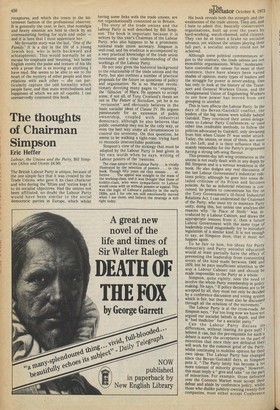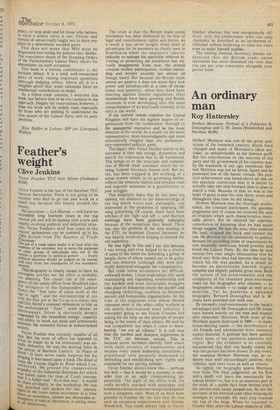The thoughts of Chairman Simpson
Eric Heffer
Labour, the Unions and the Party, Bill Simpson (Allen and Unwin £4.50)
The British Labour Party is unique, because of the one simple fact that it was created by the Trade Unions, who gave it its class character and who during the 'fifties and 'sixties kept it to its socialist objectives. Had the unions not been affiliated, no doubt the Labour Party would have been similar to the social democratic parties in Europe, which whilst having some links with the trade unions, are not organisationally connected as in Britain.
The story of the trade unions and the Labow Party is well described by Bill Simp son. The book is important because it is written by this year's Chairman of the Labour Party, who also happens to be a prominent national trade union secretary. Simpson is well-read, and his erudition is accompanied by a very practical knowledge of the trade union movement and a clear understanding of the workings of the Labour Party.
He not only gives the historical background to the relationship of the trade unions and the Party, but also outlines a number of practical proposals for the future on questions of policy and organisation. He is no Marxist revolutionary devoting many pages to ' exposing ' the ' fallacies ' of Marx. He appears to accept some, if not all, of Tony Crosland's thesis set out in The Future of Socialism, yet he is no ' revisionist ' and obviously believes in the basic socialist ideas of Clause IV. He argues passionately for an extension of public ownership, coupled with industrial democracy, although he also believes that public ownership may not be the only way, or even the best way under all circumstances to control the economy. On this question, he seems to be walking a tight-rope, trying hard to reconcile irreconcilable positions.
Simpson's view of the strategy that must be adopted by the Labour Party is best given in his own words when he says, writing of Labour posters of the 'twenties: The class nature of the Labour Party ... is vividly illustrated by the selection of posters . . . in this book. Though fifty years old they remain . . . effective . . . The appeal was straight to the mass of the working-class, and it was thought that those of middle-class, who were sympathetic to Labour would come with us without posters or appeal. This was the logic of Labour's publicity in the early 1920s, and 1 for one am still emotionally moved when I see them, and believe the strategy is still right today.
His book reveals both the strength and the weaknesses of the trade unions. They are, and I hate to admit this, basically conservative organisations, built up over the years by hard-working, watch-chained, solid citizens. They can be at times a brake on socialist advance, yet without the unions playing their full part, a socialist society could not be achieved.
Although some political commentators argue to the contrary, the trade unions are not monolithic organisations. Whilst 'moderates have controlled the unions for most of their existence, there have always been varied shades of opinion, many types of leaders and the struggle for power is never-ending. One has only to look at the history of the Transport and General Workers Union, and the Amalgamated Union of Engineering Workers to see how power has moved from one grouping to another.
This in turn affects the Labour Party. In the days of the Bevan/Gaitskill conflict, the leaders of the big unions were solidly behind Gaitskill. They convinced their union delega tions to Labour Party Conferences, or used other less creditable methods, to follow the policies advocated by Gaitskill, only deviating from him when Clause IV was under attack. Today, the unions, or most of them, are more to the Left, and it is their influence that is mainly responsible for the Party's programme having a strong left-wing flavour.
This present-day left-wing orientation in the unions is not really dealt with in any depth by Bill Simpson and is a serious weakness in the book. He also dodges any real discussion of the last Labour Government's industrial relations policy, although he goes into some detailed criticism of its Prices and Incomes policies. As far as industrial relations is concerned, he prefers to concentrate his fire on the Tory Government's ill-fated Industrial Relations Act. I can understand the Chairman of the Party, who must try to maintain Party unity, doing this, but unless one analyses-the reasons why 'In Place of Strife' was introduced by a Labour Cabinet, and draws the appropriate lessons from it, then a future Labour Government with the same type of leadership could misguidedly try to introduce legislation of a similar kind. It is not enough to say, as Simpson does, that it must not happen again.
To be fair to him, his ideas for Party democracy and Party socialist education would at least partially have the effect of preventing the leadership from committing errors of the kind made between 1966 and 1970, but he pays insufficient attention to the way a Labour Cabinet can and should be made responsible to the Party as a whole. Simpson, quite rightly, sees the need to involve the whole Party membership in policy making. He says, " If policy decisions are to be accepted by all, they must not only be decided by a conference discussion and voting system which is fair, but they must also be discussed through all the echelons of the movement." ,The Labour Party is at the cross-roads, As Simpson says, " For too long now we have not argued our socialist beliefs in depth, and this is'bad medicine' for a socialist party." Can the Labour Party discuss its differences, without tearing its guts out? I believe it can, but the pre-requisite for such a debate is surely the acceptance on the part of minorities that once they are defeated they will work for the common good of the PartY, whilst continuing to mobilise opinion for their own ideas. The Labour Party has changed since the Bevan/Gaitskill days, as Simpson puts it, "The Party lately has become a lot more tolerant of minority groups." However, this must imply a "give and take" on the part of minorities. For example, those defeated over the Common Market must accept their defeat and abide by conference policy, whilst those who dislike publicly-owning twenty-five companies, must either accept Conference
policy, or step aside and let those who believe in such a policy carry it out. Vetoes and threats of vetoes really ought not to have ony Place in a democratic socialist party. This does not mean that MPs must be dragooned into voting for policies they dislike. The conscience clause of the Standing Orders of the Parliamentary Labour Party allows for abstentions on such occasions.
This book is a serious contribution to the socialist debate. It is a solid, well-researched Piece of work, raising important questions although dodging others. Above all, it is a tangible proof that trade unionists have an Intellectual contribution to make.
As a fellow-trade unionist. I welcome this book, but believe him to be too cautious in his approach. Despite my reservations, however, I hope his book will be widely read, especially by those who are seeking to understand the true nature of the Labour Party and its persPectives.
Eric Heifer is Labour MP for Liverpool, Walton.



































 Previous page
Previous page